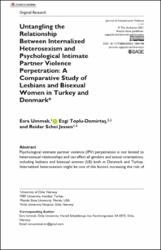Please use this identifier to cite or link to this item:
https://hdl.handle.net/20.500.11779/1479| Title: | Untangling the Relationship Between Internalized Heterosexism and Psychological Intimate Partner Violence Perpetration: a Comparative Study of Lesbians and Bisexual Women in Turkey and Denmark |
| Authors: | Jessen, Reidar Schei Toplu-Demirtaş, Ezgi Umak, Esra |
| Keywords: | Lesbian and bisexual women Cross-cultural research intersectionality Minority stress Psychological intimate partner violence perpetration Internalized heterosexism |
| Publisher: | SAGE Publications |
| Source: | Ummak, E., Toplu-Demirtaş, E., & Jessen, R. S. (2021). Untangling the Relationship Between Internalized Heterosexism and Psychological Intimate Partner Violence Perpetration: A Comparative Study of Lesbians and Bisexual Women in Turkey and Denmark*. Journal of Interpersonal Violence, 1-31. https://doi.org/10.1177/08862605211004108 |
| Abstract: | Psychological intimate partner violence (IPV) perpetration is not limited to heterosexual relationships and can affect all genders and sexual orientations, including lesbians and bisexual women (LB) both in Denmark and Turkey. Internalized heterosexism might be one of the factors increasing the risk of LB's use of psychological IPV perpetration. However, it is still unclear how being LB in Turkey and Denmark interact in the internalized heterosexism and psychological IPV perpetration relationship. The current study, therefore, presents an investigation of (a) the prevalence of sexual orientation (LB) and country (Denmark and Turkey) differences in perpetrating psychological IPV and (b) the moderating roles of sexual orientation and country on the association between internalized heterosexism and psychological IPV perpetration. A sample of 449 LB from Denmark and Turkey completed the Lesbian Internalized Homophobia Scale and the Multidimensional Measure of Emotional Abuse Scale. The results of chi-square analyses indicated that LB from Turkey and bisexual women from both countries reported significantly higher psychological IPV perpetration. The results of moderation analyses revealed that country had direct effects on the use of psychological IPV perpetration. No moderation effects were found for both sexual orientation and country in three of the four types of psychological IPV perpetration. These findings suggest that LB are not an exception to the perpetration of IPV. Furthermore, the findings were discussed from the perspectives of intersectionality and minority stress. |
| URI: | https://hdl.handle.net/20.500.11779/1479 https://doi.org/10.1177/08862605211004108 |
| Appears in Collections: | PubMed İndeksli Yayınlar Koleksiyonu / PubMed Indexed Publications Collection Rehberlik ve Psikolojik Danışmanlık Koleksiyonu Scopus İndeksli Yayınlar Koleksiyonu / Scopus Indexed Publications Collection WoS İndeksli Yayınlar Koleksiyonu / WoS Indexed Publications Collection |
Files in This Item:
| File | Description | Size | Format | |
|---|---|---|---|---|
| 08862605211004108.pdf | Full Text - Article | 641.76 kB | Adobe PDF |  View/Open |
CORE Recommender
Sorry the service is unavailable at the moment. Please try again later.
This item is licensed under a Creative Commons License
